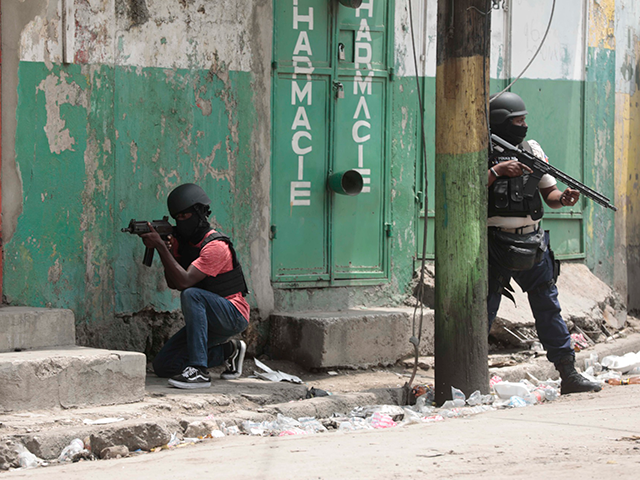Civilians in Haiti reportedly killed five more alleged gangsters and burned their bodies in Port-au-Prince on Tuesday, part of a growing trend of frustrated citizens taking the law into their own hands as criminals run rampant across the country.
One of the incinerated gangsters was dropped off at a nearby police station, whose officials refused to comment on the killings.
“The male victims were apparently brought out alive from the slum of Jalousie outside Port-au-Prince and then killed, according to people in the crowd. Most of the bodies were left strewn along the road that leads to the home of former President Jovenel Moise, who was killed in July 2021,” the Associated Press (AP) reported on Tuesday.
“At least 18 people have been reported killed by crowds in Port-au-Prince and surrounding areas since last week, although videos and pictures shared on social media suggest the number is higher. The images largely show crowds pelting men with big rocks and setting fire to gasoline-soaked tires placed around or over their bodies,” the AP noted.
“It’s horrible for them to be killed in front of the eyes of the police. That shows nobody is safe, that anybody can be killed,” a local resident told the AP.
Some other accounts of vigilante killings, such as the group of ten men snatched away from a police bust and killed by a mob last Monday, suggest the police are not terribly eager to intervene on behalf of the gangster victims.
The gangs which overran most of Haiti after the assassination of Moise have made a point of murdering and brutalizing police officers. In one especially hideous example from January, six policemen were kidnapped and executed by members of a gang called Gan Grif, and the killers posted video of themselves using the severed hands of the dead cops as holders for their cigarettes. Police officers and their supporters held a rowdy march on the residence of Prime Minister Ariel Henry to demand more protection after that incident.
Haitian human rights activist Velina Elysee Charlier told the UK Guardian on Sunday that the streets of Port-au-Prince have become a living “hell” of murders and reprisals.
“I’ve seen enough dead people for many lifetimes. Since Monday, if you get killed, you get burned. It’s kill, burn, kill, burn,” she said, referring to the first major outbreak of vigilante violence a week earlier.
“It’s nothing I would want anyone else to witness. It stays with you,” she said.
According to Charlier, the gangs had been planning to seize control of the Turgeau area without much resistance last Monday, and were taken by surprise when the populace rose up against them, armed with stones, clubs, knives, and handguns.
“We’re already dead, so we might as well die fighting,” one of the vigilantes told her.
Charlier and other Haitian human rights activists were horrified by the brutal vigilante killings but understood that people felt a need to fight back, and they did not believe either the corrupt government of Prime Minister Ariel Henry or outside forces would rescue them from the gangs.
“At some point I thought they were going to start to take matters into their own hands because they’ve got no choice. They’ve got nothing else. The Haitians, like anybody, can only take so much. The gangs have stolen their lives from them,” said former U.S. envoy to Haiti Daniel Foote.
Foote doubted anything short of a massive international intervention could stabilize Haiti, although he was personally “100% ideologically opposed” to such an operation, given the miserable history of previous U.N. peacekeeping missions.
“It’s just that bad, to be honest with you,” he told the Guardian. “It’s not Haiti anymore, it’s a prison. People stay in their houses and only leave when they absolutely have to … it’s dangerous as f**k.”
The prospects of an international intervention remain dim, in no small part because no regional power wants to put troops in the middle of a chaotic bloodbath, knowing that much of the population could turn against peacekeepers at any moment. Charlier dismissively compared peacekeeping missions to putting “a Band-Aid on a cancer,” while other Haitians have voiced suspicions that foreign troops would merely be propping up the corrupt Henry government.
U.N. special envoy to Haiti Maria Isabel Salvador issued the latest call for an international stabilization force last week, describing a “shocking increase in criminality to Haiti” at a meeting of the U.N. Security Council. To Salvador’s professed disappointment, not a single member of the Security Council volunteered to put boots on the ground, including the United States.
“The United States continues to work with a growing number of international partners to support the urgent security needs in the country,” insisted U.S. Deputy Ambassador Jeffrey DeLaurentis. He and Canada’s U.N. ambassador, Robert Rae, suggested sanctions could be an “important tool to break the power of armed gangs.”
Salvador, who hails from Ecuador, said she hoped Latin American and Caribbean nations would mount an intervention force for Haiti, but there was no sign of eagerness among those powers to get involved. She pointed to data that showed some 1,500 Haitian police officers have abandoned their posts and attempted to flee to the United States, which has a program for Haitians seeking asylum from the awful conditions in their country.
“Regional crises require regional reactions and actions, and the Haitian people cannot wait,” she sighed.
Both the Haitian police and Prime Minister Henry denounced the vigilante killings and called for calm. Henry on Monday said “the insecurity we face is appalling,” but urged the people not to descend into “mindless violence.”

COMMENTS
Please let us know if you're having issues with commenting.